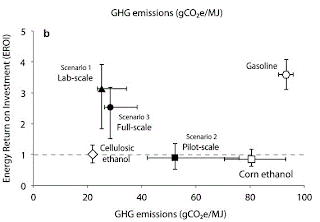 |
| Photo by: Wikipedia |
Since biomass cultivation on land poses competition to food security, perhaps we can consider using other forms of biomass from the sea? Can algae be a promising source of biomass energy, since they generally do not compete with food crops for resources and land?
It appears that there has already been strong interest in algae biofuel development. A recent Time article mentioned that while technology to make cellulosic ethanol or biofuel from algae is available, there are high costs and challenges associated with scaling the production up sufficiently to compete with oil.
Liu et al (2013)'s life cycle analysis (LCA) on algae-to-energy systems with hydrothermal liquefaction (HTL) showed that substantively lower GHG emissions can be achieved compared to gasoline as depicted by the chart below for various scenarios. Nonetheless, conventional fossil fuels such as gasoline maintain the upper edge as they enjoy a higher Energy Return on Investment (EROI).
 |
| Source: Liu et al (2013) |
HTL is of particular commercial interest because it is able to seamlessly integrates with existing petroleum refining infrastructure. During hydrothermal liquefaction, high moisture biomass is subjected to elevated temperatures and pressures, similar to the natural geological processes that has produced existing stocks of fossil fuel.
Looks like it will still be some way to go before algae biomass can become a marketable and truly climate-friendly alternative energy technology.
What an interesting post but disappointing that algae would exact a higher environmental impact than other biofuel crops.
ReplyDeleteIt could have presented a perfect solution: converting choking algae coastal overgrowths from nitrogen fertilizer runoff into a productive fuel source.
Hi Michele, thanks for the comment. In Singapore, waste-water is treated to pristine quality and recycled by mixing with reservoir water, thereby closing the water loop. Perhaps the algae technology could also some day present itself as a key to closing the waste loop, and be a carbon-neutral energy source.
Delete